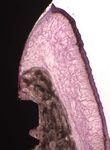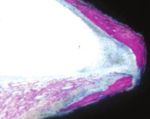The CM Implant Line - A full implant system utilizing an internal Morse taper (CM) connection
←
→
Page content transcription
If your browser does not render page correctly, please read the page content below
The CM Implant Line Cone Morse
ESTHETICALLY SIMPLE
A full implant system utilizing an
internal Morse taper (CM) connection
1Design advantages
Based on the advantages of different implant body designs, thread designs, cutting
grooves and a Morse taper (CM) connection
Combining the advantages of a Morse taper (CM) connection with a choice of implant body design, the CM implant
system offers a wide variety of choices to address virtually any current clinical situation.
The CM Implant system The subcrestal placement of
design incorporates the implant creates an esthetic
Platform Switching to and natural emergence profile
enable soft and hard tissue with improved bone and
apposition on the shoulder papilla preservation1,2
of the implant
2A highly esthetic and predictable result
Designed to enhance the peri-implant soft tissue
The tapered connection of CM implants has been designed to:
Allow for optimal force distribution
Reduce the occurrence of micro-movement
Create a hermetic seal to reduce bacterial
colonization3
Provide abutments with excellent mechanical
stability4
Images taken in the Integrated Laboratory materials of Neodent (LIM) – Curitiba - PR - Brazil
Less traumatic procedures
Excellent adaptation of the soft tissue can be achieved by reducing the number
of procedures on the implant-abutment connection through the concept of “one
abutment at one time”5,6
X-ray image of the positioning of Placement of the prosthesis on X-ray image at six-year follow-up
the implant the same day as surgery
Images of clinical case courtesy of ILAPEO - Curitiba - PR - Brazil
3A design for every indication
A wide range of options to deal with virtually any clinical situation
DriveCM
Especially indicated for obtaining high primary
AlvimCM
stability. Its conical shape and thread design make
it particularly indicated for type-III and type-IV bone,
extraction sockets and immediate loading.
Offers a reliable solution for dealing with the
majority of cases due to its tapered design. Its
conical body provides optimal primary stability and
makes it particularly indicated for type-III and type-
IV bone and extraction sockets.
Its cylindrical-conical design and high bone-
expansion thread pattern design mean it is
indicated for type-III and type-IV bone, with the
aim of achieving good levels of primary stability. TitamaxCM
Cortical
Implant design with self-tapping, cylindrical body,
especially indicated for type-I and type-II bone due
to the design of its apex and cutting threads.
4Prosthetic simplicity for an esthetic result
Offering a wide range of prosthetic options for increased flexibility
The CM Implant line offers a unique prosthetic connection for all diameters of implants
simplifying the prosthetic planning process. While there are multiple diameters of implants
to meet your clinical needs, there is one connection size for simplicity and ease of ordering.
Int Int Int Int
er er er er
Ø 2 nal d Ø 2 nal d Ø 2 nal d Ø 2 nal d
.5 iam .5 iam .5 iam .5 iam
mm te mm te mm te mm te
r r r r
Ø 3.5 Ø 3.75 Ø 4.0 Ø 5.0
Screw-retained
CM Abutment CM Micro Conical CM Mini Conical 17°/30° CM Mini
(single-unit) Abutment Abutment Conical Abutment
(multiple-unit) (multiple-unit) (multiple-unit)
Cement-retained
CM Universal 17°/30° CM CM Anatomic
Abutment Universal Abutment
Abutment
CM Exact
The CM Exact line of abutments include at
the end of the cone, a hex index that allows
for positioning the prosthesis in the implant
(prosthetic indexing), adding even more
versatility to the CM line.
* Available for CM Anatomical Abutments
and CM Universal Abutments
5The solution for difficult situations
Titamax WS range of short implants
Due to its special design, the WS range of implants is particularly suited to deal with situations where there is reduced
bone availability.
TitamaxWS
Titamax WS Cortical range
Particularly indicated for type-I and type-II bone.
Exclusive prosthetic solutions
The WS range of implants has an exclusive portfolio of prosthetic options that
have been designed for optimal system performance
Screw-retained Cement-retained
WS Abutment WS Mini Conical WS Universal
(single-unit) Abutment Abutment
(multiple-unit) (single-unit)
6Innovation and technology
NeoPoros, a unique surface with a history of more than 10 years
The NeoPoros surface was developed using a process of sand blasting and acid etching.
Through automated control in our state-of-the-art factory, the process for creating this surface is maintained.
Scanning electron microscope (SEM) images of the Neoporos surface at 2000X and 3000X amplification (images
1 and 2 respectively) show controlled roughness with a pore size of between 2.5 and 5.0μm across the surface
of the implant. The uniform roughness results in a surface topography optimized for osseointegration.
Image 1 Image 2
Bone to implant contact (BIC) histological performance at 15 and 30 days
The formation of new bone at an early stage after implant placement demonstrates the excellent performance of the
NeoPoros surface.
15 days 30 days
Images of histological sections courtesy of: Castro D.S.M, Araujo C.R.P., Araujo M.A., Benfatti C.A.M., Piattelli A., Iezzi G
7CM implant system
Esthetically Simple
Features a Morse taper connection for a secure fit;
Designed to establish peri-implant stability, preserve crestal bone and
aid in the formation of papilla;
Single prosthetic interface, regardless of the implant diameter;
Wide range of implant and prosthetic solutions for managing all types of
clinical situations including immediate loading.
1
Novaes AB Jr ., Barros RR . M., Muglia VA, Borges GJ. Influence of Interimplant Distances and Placement Depth on Papilla Formation and Crestal Resorption: A Clinical and
Radiographic Study in Dogs. Journal of Oral Implantology 2009, 35:1, 18-27.
2
Weng D, Nagata MJ, Bell M, Bosco AF, de Melo LG , Richter EJ: Influence of microgap location and configuration on the periimplant bone morphology in submerged implants. An
experimental study in dogs. ClinOral Implants Res; 2008; 19:11,1141 – 1147
3
Jaworski ME, Melo ACM, Picheth CMT, Sartori IAM. Analysis of the bacterial Seal at the implant-abutment interface in external-hexagon and Morse-taper connection implants: An
in vitro study using a new methodology. Int J Oral Maxillofac Implants. 2012 ;27:1091-1095.
4
Bernardes SR, de Mattos MG, Hobkirk J, Ribeiro RF. Loss of preload in screwed implants joints as a function of time and tightening/untigthening sequences. Int J Oral Maxillofac
Implants 2014, Ahead of print.
5
Degidi M, Nardi D, Piattelli A.: One abutment at one time: non-removal of an immediate abutment and its effect on bone healing around subcrestal tapered implants. Clin Oral
Implants Res. 2011 22:11,1303-7.
6
Grandi T, Guazzi P, Samarani R, Garuti G.: Immediate positioning of definitive abutments versus repeated abutment replacements in immediately loaded implants: effects on bone
healing at the 1-year follow-up of a multicentre randomised controlled trial. Eur J Oral Implantol. 2012. 5:1,9-16.
© Neodent USA Inc., 2013. All rights reserved. NEODENT and/or other marks and logos referenced herein are trademarks or registered trademarks in the process of registration
of Neodent USA Inc., and/or its affiliates. All rights reserved. NDUS101
Tel: 855-412-8883,
Email: info@NeodentUSA.com Web: www.NeodentUSA.com
8You can also read



























































